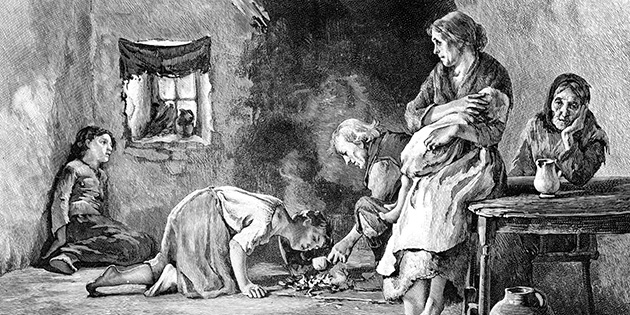
H. G. Wells once wrote that everyone who pined for ?the good old days? would change their minds the instant they got a toothache. Nevertheless, there seems to be a particular class of misanthropic pessimists who are eternally addicted to the dogma that human history is one, long, downward spiral. The very suggestion that humanity?s lot has improved, much less that capitalist democracy in particular has benefited more humans, in more ways, than any other political-economic system in history, is frankly heretical. Quote:
Jason Hickel from the University of London rejected the generally-accepted estimate of reduction in absolute poverty ?from 94 percent in 1820 to only 10 percent today??Hickel critiqued academics?and philanthropists, like Bill Gates, for suggesting that ?global extension of free-market capitalism has been great for everyone.? End of quote.
To maintain their pessimistic rage, Malthusian miserablists like Hickel take refuge in a fanciful vision of a pre-industrial Arcadia. Quote:
Hickel?s critique of the claim that absolute poverty in the world has drastically declined over the last 200 years rests on his belief that monetary income overestimates poverty in the past, when people enjoyed a lot of non-monetary benefits ?from abundant commons?. End of quote.
The reality is that, like socialist Venezuela today, the only thing that was common and abundant was literally shitty misery. Quote:
?[He] must be a king. He hasn’t got shit all over him.?
Monty Python and the Holy Grail
[The] lives of ordinary Western Europeans prior to the Industrial Revolution were dismal and fully in accord with Roser?s definition of ?absolute poverty??
The purchase of a garment or the cloth for a garment remained a luxury the common people could only afford a few times in their lives?[and] most people lived, and slept with, their domestic animals, including chickens, cows and pigs (to guard the livestock from thieves and predators). Eggs, milk and occasional meat enriched the usually bland diet of bread, and animal waste was needed to fertilize crops. The dangers inherent in using waste as fertilizer were compounded by the fact that people seldom washed their hands and clothes. That led to epidemics, and contributed to sky-high mortality rates among our ancestors. End of quote.
Of course, the great bogey-man, colonialism, gets a guernsey. Quote:
I shall leave the mixed legacy of colonialism for another day. For now, let me suggest that many ex-colonies, including the United States, Canada, Australia, New Zealand, Hong Kong, Botswana and Singapore, and ex-poor countries, including China, Chile, Mexico, South Korea, Thailand and Taiwan, have done rather well. End of quote.
Critics of the Industrial Revolution point to the sprawling slums of industrial England, as exemplified by Engels? The Condition of the Working-Class in England. Yet, no-one forced rural peasants to move to the cities. Like villagers in the rural provinces of China today, the reason the poor flocked to the slums of Manchester because, however awful they were, they were better than what they already had.
Even Engels eventually acknowledged that: Quote:
For the first time in the history of humanity?the possibility exists, given a rational division of labor among all, to produce not only enough for the plentiful consumption of all members of society and for an abundant reserve fund, but also to leave each individual sufficient leisure so that what is really worth preserving in historically inherited culture. End of quote.
Another critic of early capitalism, Jules Michelet, conceded that the Industrial Revolution: Quote:
Was a revolution in cleanliness and embellishment of the homes of the poor; underwear, bedding, table linen, and window curtains were now used by whole classes who had not used them since the beginning of the world. ? Machine production ? brings within the reach of the poor a world of useful objects, even luxurious and artistic objects, which they could never reach before. End of quote.
Cosseted Western millennials for whom ?deprivation? is not having an internet connection are only able to indulge their miserable fantasies about the present revolution in prosperity because they have no real idea of poverty. Quote:
The evidence from contemporary accounts and academic research does not support Hickel?s assertion that people in the past ?lived well? without much monetary income. Compared to today, Western European living standards prior to industrialization were miserably low. End of quote.
humanprogress.org
At least they didn?t have to worry about climate change. Oh, wait?


